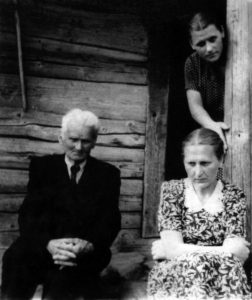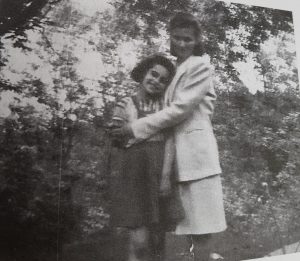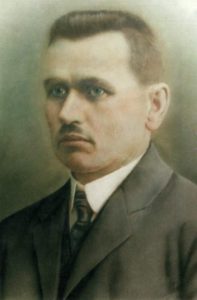Katia Segalson
Katia Segalson was born in 1934 in Kaunas as a second child to her parents, Moses-Misha Segalson and his wife Chaya (Haja)-Raya Arulianski. This prosperous family owned a factory and two shops (Katia’s father specialized in men’s wear, mainly hats). After the establishment of the communist regime the family had to leave their luxurous apartment and move to a flat which they shared with another family and a single woman. The woman’s name was Genovaitė Pukaitė and later she played a crucial role in Katia’s life.
With the beginning of the German occupation Katia’s family was interned in the Ghetto. On the eve of the Children’s action (March 27–28 1944) Katia was smuggled out through the main gate while the guards who were bribed were not looking. Genutė waited for the girl outside the gate and took her to her flat that she rented together with Pranutė Špokaitė. False papers were arranged for her but Genutė did not rely on them because of Katia’s Jewish looks – dark brown eyes and curly black hair. She hid every time other people entered the flat.
When the Soviet front drew near Genutė decided to move Katia to her parents who lived in Radžiūnai – a village in Ukmergė’s district, in the vicinity Taujėnai. With her appearance in the village rumors were spread that Katia is Genė’s illegitimate daughter. Genutė’s parents, Juozapas and Marijona Pukai, did not deny it. The Pukas couple had 5 grown-up daughters, the three of them still living with their parents, and Katia became another family member. She was treated by everybody as an equal and sometimes felt that Genutė’s parents care for her even more than for their children. When Kaunas was liberated Genė brought bad news: Katia’s mother perished during the Ghetto liquidation. Her father was deported to the west and his fate was still unknown. So Katia stayed with the Pukai for another year until in August 1945 she was found by her older brother, a soviet army solder. In 1946 she left Lithuania and reunited with her father who survived the Dachau death camp. Two years later they immigrated to Israel. Katia never met Juozapas and Marijona Pukai, but she kept contacts with Genutė Pukaitė and in 1991 Katia Segalson-Rosen hosted her in Israel.




